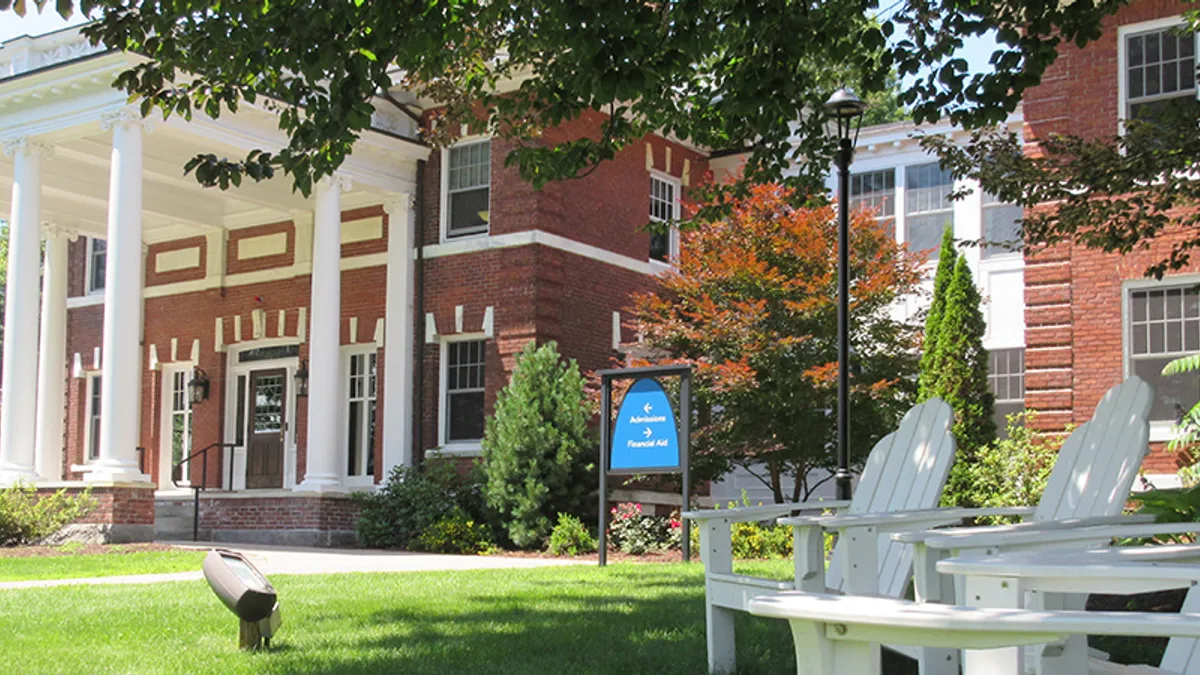The already dizzyingly confusing process of applying for financial aid was further complicated this year when the federal government postponed the release of the updated FAFSA from October to December.
Theoretically, the new FAFSA, which stands for Free Application for Federal Student Aid, would be a boon to students and families. The delay is to ensure a simplified version of the form is ready. It's expected to feature fewer questions and contain data automatically supplied by the Internal Revenue Service, which would spare college applicants and families from parsing old tax documents.
However, the change also throws typical timelines for financial assistance into disarray. State and institutional financial aid, for instance, is often based on applicants’ FAFSA information, meaning students likely will have much less time to lock down those awards — which in turn could influence where they decide to attend college.
One college has developed a solution, just for this year, that it said will help students and families circumvent some of the uncertainty.
Assumption University, a Roman Catholic institution in Massachusetts, will lock in applicants’ need- and merit-based financial aid awards immediately when they’re accepted, as early as October.
This is much earlier than at most colleges, which often distribute financial aid offers in the spring, around or shortly after admittance letters go out.
Assumption can accomplish this because it’s relying on its own questionnaire, one even shorter than the new FAFSA, to determine award amounts. Those will be guaranteed, so long as the information that families provide is accurate.
Not every college can replicate this model, as it involves careful financial calculations that, should they go awry, can be costly for an institution.
Assumption also only has to devise estimates for its roughly 2,000 students. That’s not a small number — but institutions like public flagships would have a far more difficult time making these calculations for their tens of thousands of students.
Why Assumption made the move
Assumption’s decision was rooted in a desire to make its brand of liberal arts education more accessible, said university President Greg Weiner.
Weiner said in an interview that a philosophical split of sorts is happening in higher education.
The public believes wealthy students should be able to access Assumption’s type of “humanizing” education, while their financially strapped peers are encouraged to pursue trade programs and other short-term credentials that push them up the social mobility ladder, Weiner said.
Conversations about the relevance and return on investment of colleges has indeed dominated debate in recent years, especially as the cost of higher ed rises. Research consistently shows the American people have in recent years grown more skeptical of college as a public good — and have become more attuned to actual post-graduation earnings.
Weiner said he has nothing against career preparation, but “there are also a lot of young people from less advantaged backgrounds who are yearning to ask the big questions,” too.
“What we are somehow perversely doing in the name of equity is saying ‘You don’t get to do that,’” Weiner said.
And so Weiner, who was named the institution’s president about a year ago, said he was excited by the admissions approach his team brought to him. It fits with the access piece of the 119-year-old university’s strategic plan, Weiner said.
Assumption estimates financial aid awards for the coming academic year will average about $35,000, said William Boffi, the university’s vice president of enrollment management. Assumption officials are telling applicants to complete the FAFSA to round out state and federal entitlements.
Students at Assumption, like most attending private colleges, rarely pay sticker price, which for the 2023-24 academic year was $48,552.
The most recently available federal data shows students paid an average net price of $28,911 in the 2021-22 academic year. Net price is the cost after factoring in financial aid.
In 2021, 20% of its students received federal Pell Grants, which is a proxy for low-income status.
The guaranteed awards will offer students some comfort, Boffi said. Assumption won’t promise to lock in aid while also jacking up rates on expenses like housing. The university will commit to those prices as well, Boffi said.
Boffi said the venture was truly designed to take away the financial aid guesswork for families, but both he and Weiner acknowledged it could also be a recruiting tool.
After all, with the FAFSA delay, an early assured financial aid offer could help persuade some students to attend Assumption rather than waiting to hear about financial aid from other choices.
Assumption experienced a COVID-era contraction, Boffi said. Federal data shows Assumption’s enrollment dipped from 2,443 students in fall 2019 to 2,059 students in fall 2022.
What information does Assumption want?
Boffi said while the model requires careful financial stewardship, Assumption’s financial aid form will offer a sound approximation of how much to award to students.
The university will assuredly lose some money with these estimates, he said, but that’s likely to be hundreds of dollars per student, not thousands.
“There’s some risk to the university,” Boffi said. “But we’re willing to take that risk.”
Assumption’s financial aid questionnaire asks for many of the same metrics as in the FAFSA, like how much applicants and their parents earned last year.
It’s 24 questions long, while the new FAFSA has 36, down from 108.
The new FAFSA also gets rid of the methodology for determining financial aid, which was known as Expected Family Contribution. That will now be the Student Aid Index, which is similar to EFC, but adds new considerations, such as if another family member is in college.
Colleges, as well as higher ed associations and other advocacy organizations, have been prepping for the changes.
Among them have been the National Association of Student Financial Aid Administrators, or NASFAA. The organization said in an emailed statement last week that it hadn’t heard of Assumption’s financial aid system.
But it said “research has long shown that getting accurate financial aid information to students as early as possible increases the likelihood of them enrolling in postsecondary education.”



















